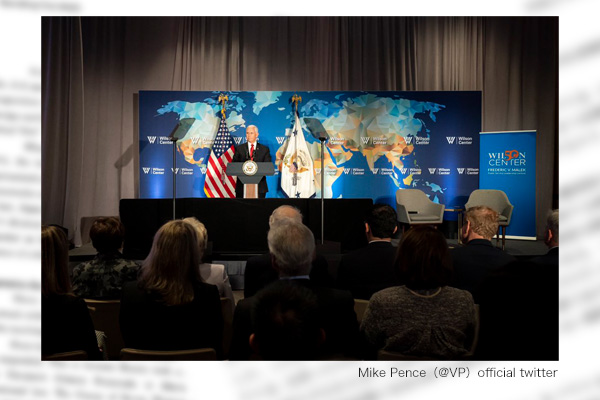On October 24, U.S. Vice President Mike Pence delivered a speech on China for the second time in 13 months. Since his speech in October 2018 that comprehensively criticized China’s domestic and foreign policies, “Beijing’s behavior has become even more aggressive and destabilizing,” he said. Particularly, Pence expressed a sense of crisis about the Hong Kong situation featuring massive protest rallies and urged China to show restraint. In relation to Japan, Pence said: “In the East China Sea, in 2019, our close ally, Japan, is on track to scramble more fighter aircraft sorties in response to Chinese provocations than in any previous year in history. And China’s Coast Guard has sent ships for more than 60 days in a row into the waters around the Senkaku Islands, which are administered by Japan.”
In addition to the United States, other Western countries expressed concerns about China in regard to the Hong Kong situation at this year’s Group of Seven summit that took place in France in August. As liberal democracies in the world grow more critical of China, Japan’s plan to invite Chinese President Xi Jinping as state guest next spring may lead other democracies to view Japan as abnormal. The Japanese government should reconsider the plan.
China used Japan for breaking through its isolation
When China was isolated from the rest of world amid Western sanctions for the 1989 Tiananmen military crackdown on pro-democracy demonstrations, Japan offered a helping hand by realizing the emperor’s visit to China in 1992. Then Chinese Foreign Minister Qian Qichen said in his memoir that the emperor’s China visit served as a way for China to break through the Western sanctions, pointing out Japan as the weakest link of the sanctions. Japan now is about to repeat the same mistake.
National Defense Academy of Japan President Ryosei Kokubun, an expert on China, says that President Xi is restraining himself from referring to history issues regarding Japan. Several years ago, however, President Xi ordered the substantial expansion of a museum in Harbin on Unit 731, a wartime Japanese unit for research and development on biological weapons, complaining that the facility was too small. On October 26, Chinese Foreign Minister Wang Yi also referred to history issues regarding Japan at the Tokyo-Beijing Forum in Beijing.
Beijing detains an inconvenient Japanese scholar
And recently, China put a professor at Hokkaido University under detention as the Japanese scholar was visiting China at the invitation of the Chinese Academy of Social Sciences. The expert on Japan-China relations before the end of World War II belonged to Japan’s National Institute for Defense Studies between 2007 and 2016.
President Xi has held large-scale ceremonies to celebrate China’s victory over Japan in World War II, making a propaganda emphasizing the Chinese Communist Party’s victory over Japan. In fact, however, the Japanese imperial army fought mainly against the Kuomintang nationalist party while the CPP’s Eighth Route Army provided the Japanese army with classified intelligence on the Kuomintang. It might have been very undesirable for the CCP to have the fact published in Chinese.
The detained professor has also published papers titled “Development History of CCP’s Intelligence Organizations” and “Public Security Organizations that Guard the Party” that write about CCP’s intelligence organizations and its propaganda and media warfare. Researches into the party’s intelligence and public security organizations might also have been inconvenient for China.
“Japan-China relations have completely returned to a normal orbit,” Japanese Prime Minister Shinzo Abe said at the House of Councilors Budget Committee in March. However, the CCP has not changed essentially, as clearly indicated by recent Japanese polls that show growing negative views about China.
Fumio Ota is a senior fellow and a Planning Committee member at the Japan Institute for National Fundamentals. He is a retired Vice Admiral of Japan’s Maritime Self-Defense Force.


